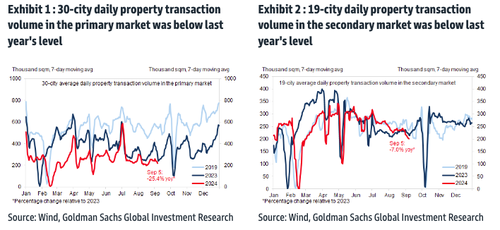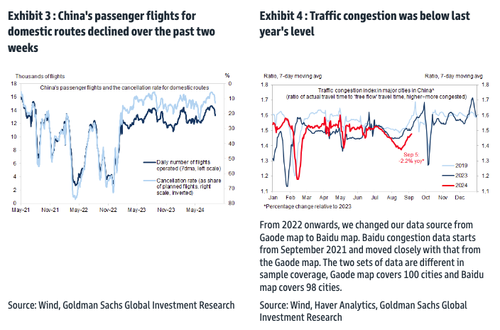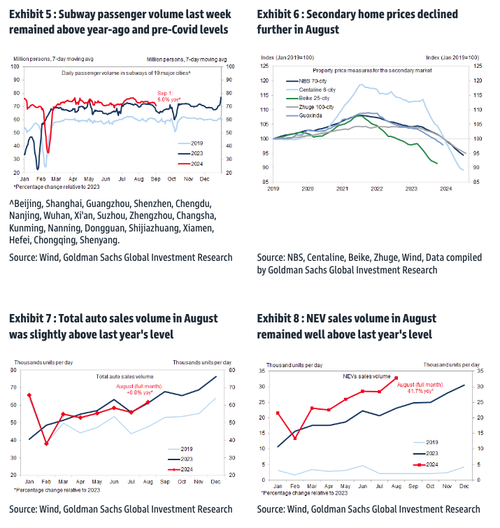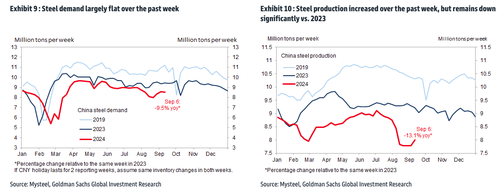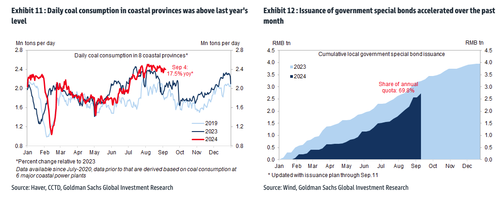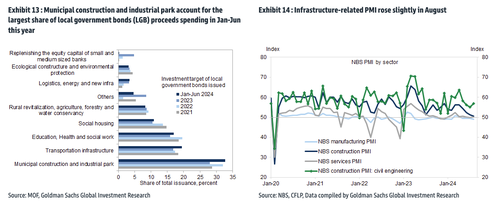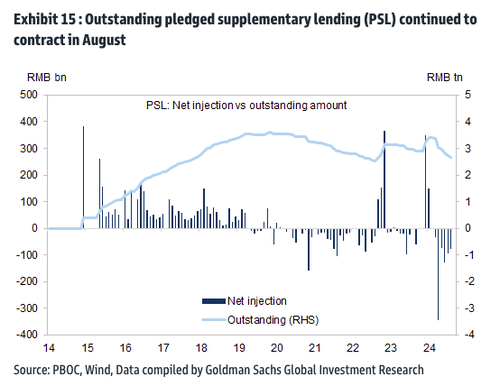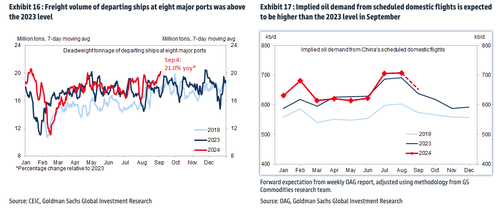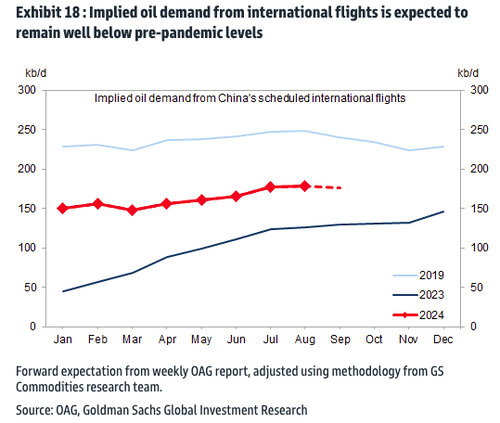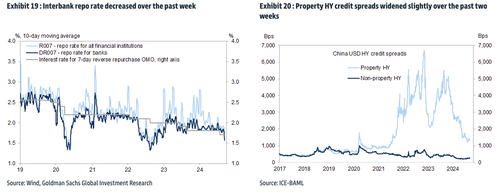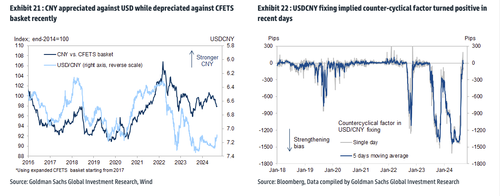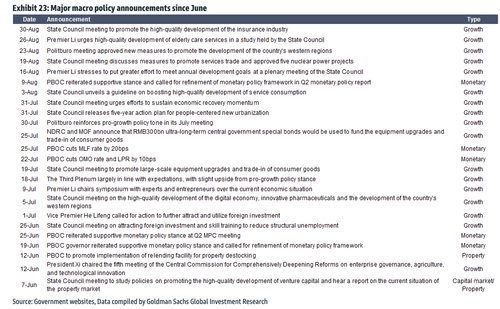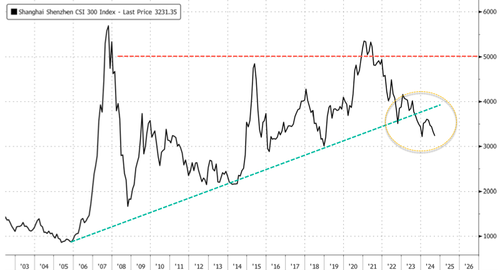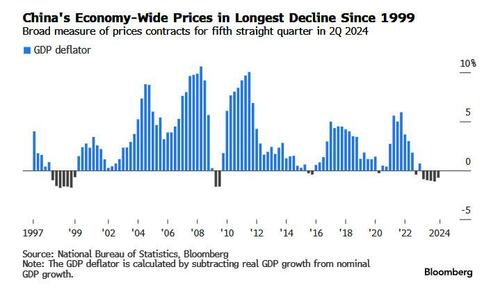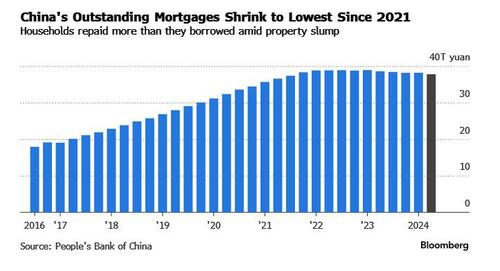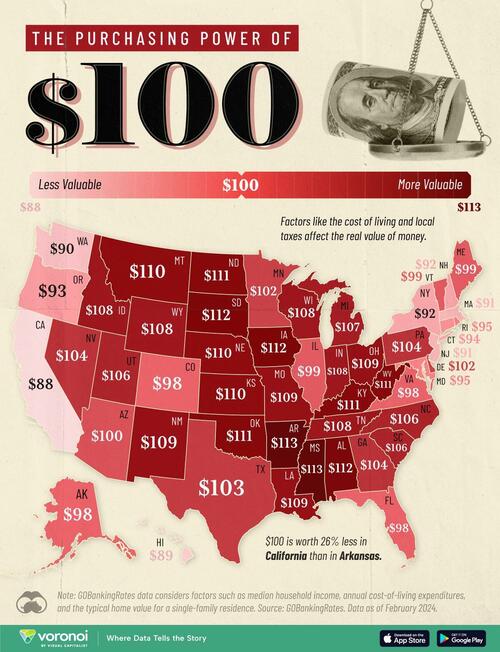Authored by Matt Stoler via TheBIGNewsletter.com,
“The essence of antitrust law is to try to keep the system working by recognizing that, at certain points, some companies may get too big for their own good, they’re self-imploding, or the technology may become so dominant that it’s just crushing all other elements where there can be innovation.”
– Judge Leonie Brinkema, 2023, United States v. Google LLC
In the late 1930s, it appeared as if Antitrust Division chief Thurman Arnold had tamed the business world, having filed so many antitrust suits with such effectiveness that there was no longer any resistance. In his first year, Arnold filed 1,375 complaints in 213 cases in 40 different industries, from cars to housing to milk to movies. When enforcers merely launched an investigation, prices dropped by 18-33 percent because businessmen wanted to get ahead of any possible violations.
There was still a lot of brutal fighting ahead, but in a sense, the old order in the business world had been morally defeated, exhausted by years of legal combat.

A NYT headline from 1936.
The new order was immensely profitable, far more than that of the 1930s. Some of the highest corporate profit margins in American history were in the 1950s, but corporate leaders knew they had a broader responsibility to society. And it wasn’t nonsense corporate social responsibility rhetoric we hear about today, but a realization that rapacious behavior would bring swift legal consequences.
It worked. “The Money Trust has disappeared, and Wall Street is a symbol only to students and those with long memories,” wrote economist Carl Kaysen in 1954. John Maynard Keynes had penned a private letter to Franklin Delano Roosevelt about business leaders. He wrote, “You could do anything you liked with them if you would treat them (even the big ones), not as wolves or tigers, but as domestic animals by nature, even though they have been badly brought up and not trained as you would wish.” FDR tamed big business.
Anti-monopolists today are nowhere near that level of accomplishment broadly speaking, as we don’t have a political consensus. But in a few areas, we can start to see the outlines of what a world run with some element of the public interest in mind might look like. And that brings me to Google, whose mission has always been what years ago sounded like a good idea, “to organize the world’s information and make it universally accessible and useful.”
Next Monday, the third major antitrust trial against Google starts, this one on the software plumbing underlying online display advertising. Because of your willingness to subscribe to BIG, I have the money to hire someone to cover the trial, as we did with the search trial. Our new writer is a lawyer named Tom Blakely, and he’ll be writing updates at our special site, BigTechOnTrial.com. You can sign up there for updates, and if you’d like to support this work, please consider joining as a paid subscriber.
But the context for this trial is very different than the first search trial. The reason is simple. Twice now Google has been ruled to be an unlawful monopoly. The first case involved its control of the Android app store in its fight with Epic Games, and the second was over its search monopoly in its tussle with the government. Moreover, in both trials, the judges have found Google to act in bad faith with its treatment of documents.
Neither case is finished. In the Epic Games case, Judge Donato is likely to come out with a proposed remedy shortly, which will basically force Google to allow other app stores to exist. In the search case, Judge Mehta today laid out a schedule to have the remedy phase wrapped up by August, with a sense of what the remedies might be by the end of this year. (It seems like AI is going to be a place where both parties are going to focus). There will be appeals.
This third trial is about a totally different line of business, which is the software that third party publishers and advertisers use to buy and sell ads, as well as the exchange in the middle, which in aggregate is a $20 billion a year domestic business. Publishers sell more than 5 trillion digital display advertisements on the open web each year, which is 13 billion a day. One way to think about it, as Google does, is as the “operating system” for advertising.
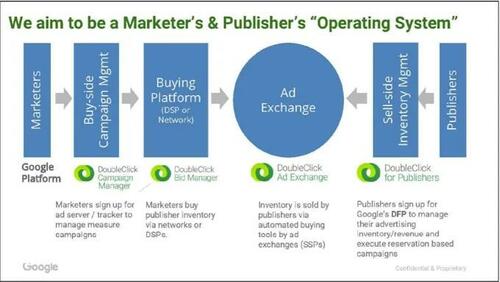
When Google first started, it was a high-quality search engine, and its founders believed that advertising presented an inherent conflict of interest for any such product. “Advertising funded search engines,” they wrote, “will be inherently biased towards the advertisers and away from the needs of consumers.”
Nevertheless, in 2000, the venture funded company, after failing to build a technology licensing business, started an advertising arm, quickly building up a large number of advertising customers who liked the ability to put text ads next to relevant search results. In the early 2000s, Google started a third party advertising business, cutting deals with publishers that let them put Google Ads on their web pages and take a slice of the ad money. In this way, publishers began accessing the ad demand that Google had control over. But this new line of business introduced another conflict of interest, since Google was now edging closer to controlling both the buyers of ads and the sellers of them, and all the user data advertising and publishing tracked.
In 2007, Google bought YouTube, a source of ad inventory, giving it more power over the selling of ads. In 2008, Google purchased an adtech company called DoubleClick, which had been the leading provider of software to allow publishers to manage their ad inventory, as well as a large repository of data. Slowly, subtly, Google was intermediating as both the buyer and seller in the ad market, an obvious set of conflicts. Before its purchase, Google had tried to enter DoubleClick’s business, but failed, because it’s hard to move from one software platform to another. DoubleClick’s former CEO had observed, “Nothing has such high switching costs. . . .Takes an act of God to do it.” That same year, Google also bought an ad exchange (AdX), where buyers of advertising could match with sellers of ad inventory, in a quasi-financial market.
After buying DoubleClick, Google tied its control over advertising demand to publisher use of its software. As the DOJ put it in the complaint, “If publishers wanted access to exclusive Google Ads’ advertising demand, they had to use Google’s publisher ad server (DFP) and ad exchange (AdX), rather than equivalent tools offered by Google’s rivals.” The result is that it acquired a monopoly across the entire industry, in the software publishers use and the matching engine for advertisers. It also built a ubiquitous service Google Analytics that measured web traffic for publishers, so it did all the measurement as well.
One consequences was that Google charged high prices, keeping between 30-50% of every advertising dollar that went through its system. That take rate was bad enough. But Google also acquired surveillance capacity over every publisher and advertiser. It was as if every night Google could break into the offices of the Wall Street Journal and take its subscriber list, and then go to its own advertising clients and tell them that it could sell them access to Wall Street Journal readers for much cheaper rates when those readers opened Google owned and operated properties, like Gmail, YouTube, search, and so forth. In doing so, Google gained the ability to direct ad revenue away from third party publishers to itself.
To buttress its ability to target, in 2016 Google violated a promise it made when it bought DoubleClick. It had told enforcers it would guard user privacy and segment data. Instead, it decided to combine all data across all its different services, from Gmail to YouTube to search, into detailed dossiers of each user. Google now had a machine, where it could spy on users across the open web, and then use that data to manipulate ad auctions, both charging high prices when display ads went on third party sites, and simply moving broad ad demand to its own properties instead of third party sites.
The same template repeated over the next ten to fifteen years. Publishers or ad entrepreneurs would try to find a way into auctions for ads to take some of Google’s margin and protect their data, and Google would respond by either buying their rival, locking out their rival with some sort of tying of its products, or both. There were a host of code words and programs to engage in these kinds of tactics, like “Project Nernanke,” “Project Narnia,” and “Jedi Blue.” And since publishers and adtech startups needed the huge amount of advertising buying power that Google controlled, and advertisers needed Google search and YouTube, it was a chicken and egg problem. You couldn’t get into either market without Google’s permission.
We did see glimpses of what would happen if Google’s control was broken. During a period when there were more open auctions called “header bidding,” publisher revenues increased by 30-40% and advertisers got more transparency in where their ads went. But Google would quickly regain control, and publishers would start bleeding out again. Indeed, the death of journalism and publisher isn’t just due to the “internet,” it’s likely a murder by Google.
The only possible challenger in this ecosystem was an entity so big it could build its own ecosystem. Enter Facebook, which had enough advertisers, so much ad demand, that it didn’t need Google. At one point, during the fight over header bidding, Facebook considered breaking Google’s monopoly in online display advertising by allowing third parties to get access to Facebook ad demand through what was called Facebook Audience Network (FAN). This move would draw publishers and advertisers away from Google’s ad auction system. Google’s response was to form a cartel with Facebook where Facebook would get better terms in Google auctions than anyone else in return for Facebook no longer seeking to compete in open auctions.
The panoply of behavior, locking in both sides of a network, engaging in surveillance, thwarting rivals through coercive practices and unlawful acquisitions, and then manipulating pricing, across a host of markets, is the essence of the case. Google has reasonable counter-arguments, notably that there are other ways of buying advertising aside from going through Google’s system, and thus it’s not a monopoly. You can buy ads on Amazon, Meta, Snap, and TikTok, for instance. But most court watchers seem to think that the complaint is strong, and that Google is going to lose its third case.
And what does Judge Brinkema think? So far, Brinkema, while ruling against the DOJ on their request for a jury trial, has been strongly skeptical of Google’s arguments and its team. She denied Google’s motion to dismiss for all five monopolization claims, saying “there are enough specific allegations, including various quotes from people within Google, you know, referring to some competitors as presenting existential threats,” that the case should go to trial.
Beyond that, she laid into Google for having a policy since 2008 of automatically deleting chats wherein employees talked about sensitive topics to avoid government investigations. I went to the courtroom last week to watch, and it was brutal. “There are a whole bunch of problems with how Google handled” evidence, she said, which likely had “incredible smoking guns.” She called Google’s practices a “clear abuse of the process” and “absolutely inappropriate,” and said that “an awful lot of evidence has likely been destroyed.” More importantly, she said she would not trust Google’s testimony. “As you call your witnesses,” she said, “This will be something to keep in mind.”
So what happens if Google loses?
Remedies are often difficult in antitrust, because monopolized markets can be understood as hardened concrete and hard to take apart. You kind of just have to smash; that usually works, the risk is a reluctance of enforcers and judges to ask for the hammer. In this case, however, the fix, which would save publishing, is pretty simple. In fact, Senators Mike Lee and Amy Klobuchar have a bill called the AMERICA Act that is tailor made for this case, and would restructure the industry by prohibiting conflicts of interest for big adtech firms.
What is necessary is a series of break-ups and a set of internal data transfer rules. The first break-up would be splitting off Google’s adtech businesses, creating three independent companies – a supply side/analytics ad platform, a demand side platform for advertisers, and an exchange. It’s also critical to make sure that no more third-party publishing data is harvested and monetized by Google. The way to foster that solution would be to split Google’s other businesses so it couldn’t combine data, into new independent companies YouTube, search, Android, and Chrome. Barring that, a behavioral remedy prohibiting the sharing of data internally would make sense, though would require a technical committee and a robust enforcement regime.
Yet this case isn’t the end of the road, and it’s not clear where Google’s legal travails end from here. Texas is leading a bunch of states in suing the search giant. Yelp just filed a suit against Google. There is an antitrust investigation of Google Maps. The Federal Trade Commission has consent decrees against Google over surveillance, and judges are beginning serious rollbacks of the legal protection, known as Section 230, on which Google relies to avoid liability for its services.
And that’s just domestically. Google already settled for the same adtech charges in France a few years ago, and the U.K. charged Google today over its practices as an ad intermediary. And last year, the E.U. Competition Authority found Google liable for monopolization in this space, and even called for a break-up. “Only the mandatory divestment by Google of part of its services,” wrote the EU Competition Authority, “would address its competition concerns.” It even included a nice graphic with scissors

Now, I think the EU enforcers aren’t serious, and I think they might do a snip here and a snip there without taking a meaningful swipe at the problem. Still, that Google may have to face a break-up threat from Europe shows the extent of their problem.
Ok, so what does all of this noise mean? Well, in a year, we might have three different judges overseeing antitrust consent decrees and/or break-ups over different parts of Google’s business. I went to a conference with some of the world’s leading experts on antitrust two days ago, and none of them could think of any remotely similar historical precedent. Are those judges going to collaborate? What if they disagree? Will they de facto serve as regulators of Google going forward? What if they set up technical committees to carry out consent decrees? Wouldn’t these simply become an administrative state fostered by the judiciary? Such an institutional set-up could eventually become the basis for a new regulatory regime.
And there’s precedent for that, at least. In 1982, AT&T got frustrated with being the villain, and decided they were going to lose an antitrust suit. So they agreed to a break-up, which both forced the company to split up into local operating companies and long-distance/Bell Labs/Western Electric, but also lifted restrictions that prevented the company from going into the computer industry. They saw opportunity in going smaller. At the same time, when Judge Harold Greene oversaw the break-up of AT&T, he essentially ran large chunks of the telecom system out of his courtroom until Congress passed the Telecommunications Act of 1996. That’s 14 years of regulation by the judiciary, followed by Congressional action to organize a new telecom regime.
What happens with Google?
At some level, Google’s executives are tired of being punching bags. Already, they have tried to buy two different companies this year for $20 billion+ apiece, and gotten rejected both times. Judges are routinely taking them to task for bad document handling, and so the place is now likely crawling with cautious lawyers. The bad press is routine and overwhelming. Executives are distracted. The jeering over its missteps on AI are embarrassing, and it’s no longer as cool to work there.
Like AT&T in the 1980s, or Standard Oil in the 1910s, or Alcoa in the 1940s, the writing is on the wall.

That doesn’t mean Google’s business is over, in fact, I suspect that its best days are ahead of it. If Google shrinks itself to be a pure search utility that sells search ads and licenses its search technology, divesting itself of everything else, it will be immensely profitable and its legal problems will go away. Its other lines of business will flourish independently, and lots of innovative employees will be able to build, free from the distraction of the legal thickets in which it is entangled. However, it does mean that Google will have to give up on its mission, “to organize the world’s information.” Though that slogan looks benign, it is in fact anything but. Being the organizer of the world’s information is far far too much power for anyone to have. It’s time to give up on it.
So how will we know when we reach a post-Google world? Well, when entrepreneurs start seeing opportunity to build businesses in a more open market for advertising, search, or journalism, we’ll be there. Right now, you don’t go near these spaces, because Google will crush you. But there are immense opportunities once you split apart this corporation. Google search isn’t very good anymore, but new competitors, like Neeva, die without access to distribution. Its AI products aren’t nearly as high quality as they should be considering Google scientists created the underlying transformer technology. Without Google standing in the way, innovation will explode.
Similarly, the Google adtech ecosystem should be much better than it is. It really doesn’t make sense to have all advertising channeled through one entity. Proctor and Gamble has very different needs than some guy selling weird t-shirts, network TV shows have very different ad inventory than random guys online talking sports and fart jokes or highly contested partisan message boards.
We hear advertisers talking about “brand safety” and using terms about the need for content moderation, but that’s just another way of saying that there is a lack of options in the advertising market. This dynamic didn’t use to be a problem prior to Google’s monopolization, you didn’t advertise toys in Playboy and you didn’t market a magazine about cooking to advertisers looking to sell industrial machinery. But today we effectively have every advertiser and publisher swimming in one giant worldwide pool, and Google says “micro-targeting” in an attempt to make us think that the advertising and media world makes sense when it clearly doesn’t.
You could say something similar for email, video sharing, mapping, mobile phones, and the other Google infrastructure. These are all areas ripe for innovation and disruption, and we’ll know we’re in a post-Google world when we see venture capitalists financing businesses trying to do just that. The rule of law, it turns out, is not only a way to structure political equality, it’s good for business.
And frankly, most people are going to make a lot more money in that world, even if Google’s executives aren’t the empire builders they once imagined themselves to be.

